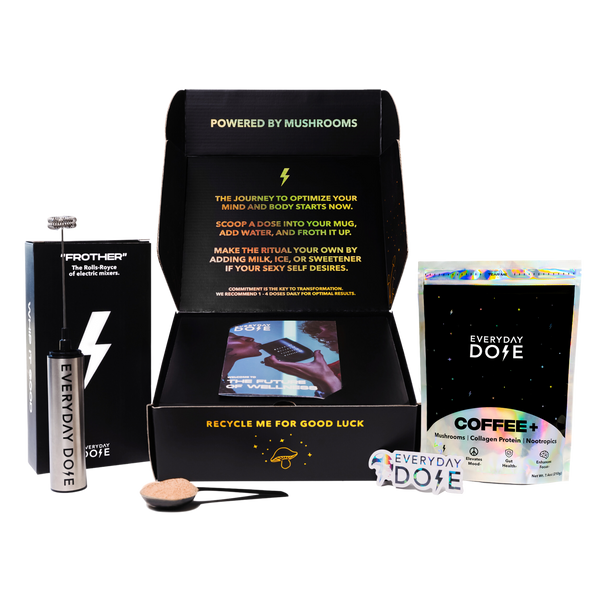Does Coffee Cause Bloating?

It’s 2024 — by now, we all know that our bodies change day to day, and there’s no such thing as a consistently perfect figure. Some days we fit into our jeans from high school, and on others, bloating can make us turn to our faithful joggers.
There are many things that can cause bloating, and we’re sorry to say that one of those things may be coffee. If you like to start your day with a steaming cup of joe, here’s what you need to know about the connection between coffee and bloating.
How Is Bloating Related to Gut Health?
While bloating can be frustrating to deal with (especially if you’re trying to show off that summer bod), it’s often just a symptom of a deeper problem. When we peel back the layers of how our bodies work, bloating really comes down to gut health.
Our gut is home to trillions of bacteria that exist in a healthy balance. These bacteria do everything from digesting food and producing vitamins to improving mental health and boosting the immune system. However, if there are more bad gut bacteria than good, one of the red flags you might see is extra bloating that seems to come out of nowhere.
Another way that gut health can affect bloating is through gastric motility. This is a fancy term that basically just refers to how fast food moves through the digestive tract. If food sits for too long, it’ll start to produce extra gas, which can build up and contribute to bloating. Not to mention, gas buildup can cause some pretty serious cramping — it’s no joke!
Does Coffee Cause Bloating?
The short answer is maybe — unfortunately, coffee might cause bloating in some people. Current research doesn’t have a definite answer on whether coffee is truly linked to digestive upset, but many people insist that coffee triggers or exacerbates issues like indigestion and bloating.
It may be possible that this bloating effect is due to a rise in certain gut bacteria after drinking coffee. Caffeine is also not recommended for people who have IBS or similar digestive conditions because it can cause digestive upset.
Caffeine (one of the major compounds found in coffee) can also influence the production of stomach acid. In some cases, this can cause bloating. It can also cause some other gnarly symptoms like heartburn, nausea, and stomach cramps.
Finally, coffee has diuretic properties, which just means it’ll send you to the bathroom. If you’re not drinking enough water to replace your lost fluids, you can easily become dehydrated. Dehydration can cause your body to hold onto water, which can also make you look bloated.
It Might Not Be the Coffee: What Else Causes Bloating?
If coffee makes you bloat up, you don’t need to call it quits yet. Before you toss out your beloved brew, you might want to make sure it really is the coffee itself causing your digestive issues, as opposed to another part of your morning routine.
Coffee Additives
Not everyone likes their coffee black. If you’re someone who prefers to get their caffeine fix in the form of sugary lattes and blended shakes, then the culprit behind your bloating could very well be one of the extra ingredients in your daily beverage.
For instance, milk can cause bloating in people with lactose intolerance. Even non-dairy milk alternatives can cause bloating if you happen to be sensitive to their ingredients.
Additionally, sweeteners like sugar and syrups can cause imbalances in your gut microbiome, especially if your general diet is high in sugar. And, if you’re trying to avoid sugar, going sugar-free isn’t exactly the answer. Many low-carb coffee syrups are sweetened using artificial sweeteners, which are known to kill off good gut bacteria.
Stress
As it turns out, stress can cause more than inconvenient breakouts and heart palpitations. If you ever start to feel like your gut is out of whack, think about what’s going on in your life — have you been under any stress recently?
When you're stressed, your body pumps out cortisol, which is aptly called the stress hormone. This can mess with digestion, slow it down, and cause food to stick around longer than it should. Plus, stress often leads to shallow breathing, which makes you swallow extra air. Add to that the stress-snacking (hello, chips and chocolate!), and you've got a recipe for a bloated belly.
Diet
Your diet can be the ultimate culprit when it comes to bloating. Let’s start with the usual suspects: fizzy drinks. All those bubbles you’re sipping on don’t just vanish — they set up camp in your gut.
Then there are fiber-heavy foods like beans, broccoli, and lentils. While they’re great for your health, your gut bacteria can create a lot of gas while they digest all of that fiber.
If you’re lactose intolerant or sensitive to gluten, bloating might be the first sign you’ve eaten something you shouldn’t have. Plus, ultra-processed foods can often contain ingredients like sugar, artificial sweeteners, and preservatives that can disrupt your gut balance and cause you to inflate.
Does Cutting Out Coffee Help With Bloating?
Cutting out coffee might help with bloating, but it’s not a guaranteed solution. If you suspect your daily brew is causing your belly to bloat, the best approach is to test it systematically.
Start by slowly reducing your coffee intake over a couple of weeks. Quitting cold turkey can bring on withdrawal symptoms like headaches or fatigue, which you definitely don’t need on top of bloating.
Once you’ve been coffee-free for about two weeks, reintroduce a small amount of plain black coffee. If you feel fine, coffee itself might not be the issue. But if bloating returns, you might have your answer.
For many, the culprits are additives like milk or sweeteners, not the coffee itself. Gradually add these back one at a time to pinpoint the problem. Remember, everyone’s body is different — some people can handle an espresso shot, while others puff up after a single sip of regular brew. Trial and error is key!
How Can You Avoid Bloating When Drinking Coffee?
If you catch yourself getting bloated after your morning cup of coffee, there are a few courses of action you can take. First, you’ll want to bring your concerns up with your primary care provider so they can check for potential underlying causes. In the meantime, here are a few other ways you can beat the bloat.
Switch to Low-Acid Coffee
Some of coffee’s irritating effects might simply be a reaction to the acidity of your coffee. The pH of coffee depends on where the coffee beans come from, how they’re roasted, and how they’re prepared. In general, though, the pH of coffee lies somewhere between 3.97 and 5.37.
If your Brazilian light roast is making you feel sick, you could try switching to a medium or dark roast from Ethiopia or Guatemala. Generally speaking, the lighter the coffee is, the more acid is in your cup.
If your stomach can handle it, you can also try pouring in some milk to cut the acidity of your coffee. Milk generally has a pH of about 6.0, which can help bring your coffee closer to a neutral acidity level.
Drink Gut-Soothing Teas
Drinking soothing teas can help lower your bloat levels and restore digestive equilibrium. For instance, peppermint tea can help relax the muscles in your digestive tract, easing gas and cramps.
Chamomile also reduces inflammation and promotes relaxation, which can calm bloating caused by stress. Ginger tea is another powerhouse for digestion, helping to reduce gas and speed up food movement through the gut.
Limit Caffeine Intake
For some people, the issue might not be coffee at all — in fact, caffeine itself can be a common trigger for feeling bloated. In this case, there are several options you can try.
For instance, green tea has significantly less caffeine than a cup of coffee. Decaf or half-caf coffee is another popular option. Remember, you don’t have to give up caffeine entirely. You can experiment until you find an amount that works best for you and your digestive system.
Exercise
If you’re feeling bloated, a little movement might be just what you need. Exercise helps stimulate your digestive system, encouraging trapped gas to move along and reducing uncomfortable puffiness.
Gentle activities like walking or yoga can work wonders, especially poses that involve twisting or stretching your torso. Cardio also boosts circulation and promotes healthy digestion. Plus, exercise reduces stress, which can be connected to bloating. The key is moderate movement — nothing too intense, as overdoing it can sometimes make matters worse.
Try Mushroom Coffee Instead
We know how important it is to have a hot drink in the morning, which is why we’ve spent our time and energy developing a functional coffee that supports healthy digestion and encourages mental focus. And the best part? Our mushroom coffee contains coffee extract so that it tastes just like regular coffee — just with more benefits.
You can enjoy Everyday Dose mushroom coffee on its own as a hot drink or blend it up with some milk to make a mushroom coffee latte. Whatever you decide to do, you can rest assured that the joggers can stay in their drawer.
The Final Breakdown
The bottom line is that yes, coffee can cause bloating. However, it might not be the coffee itself — your bloating could also be caused by sweeteners and milk, stress, or even your diet.
If you do start to feel bloated after drinking coffee, try drinking some gut-soothing tea, exercising, or opting for low-acid coffee. Or, if you’re like us, you might want to look for a way to skip the bloat without sacrificing your favorite cup of joe.
That’s where our Mushroom Coffee+ comes in. It’s easy to make, has a robust coffee flavor, and even has some extra gut-supporting ingredients like lion’s mane mushroom and collagen protein. To learn more about how our mushroom coffee can support your health, visit the Everyday Dose blog today.
There’s no definite research that shows a strong connection between coffee and bloating. That said, it may still contribute to bloating in some people, and many people still insist that coffee makes them feel bloated.
If you’re one of these people, try switching to low-acid coffee, limiting coffee intake, or swapping your regular coffee out for mushroom coffee. Learn more about the benefits of mushroom coffee by visiting the Everyday Dose blog today.
Sources:
Effects of Coffee on the Gastro-Intestinal Tract: A Narrative Review and Literature Update | PMC
Dietary fiber from coffee beverage: degradation by human fecal microbiota | PMC
5 Foods to Avoid if You Have IBS | Johns Hopkins Medicine
Acids in brewed coffees: Chemical composition and sensory threshold | PMC
Caffeine induces gastric acid secretion via bitter taste signaling in gastric parietal cells | PMC
High Intake of Sugar and the Balance between Pro- and Anti-Inflammatory Gut Bacteria | PMC
RESEARCH ALERT: Artificial Sweeteners Significantly Alter the Small Bowel Microbiome | Cedars-Sinai
Changes in pH of Milk During Freezing and Frozen Storage | ScienceDirect





